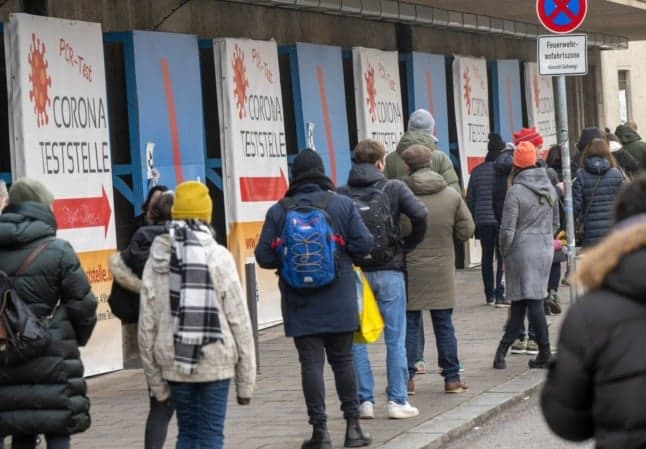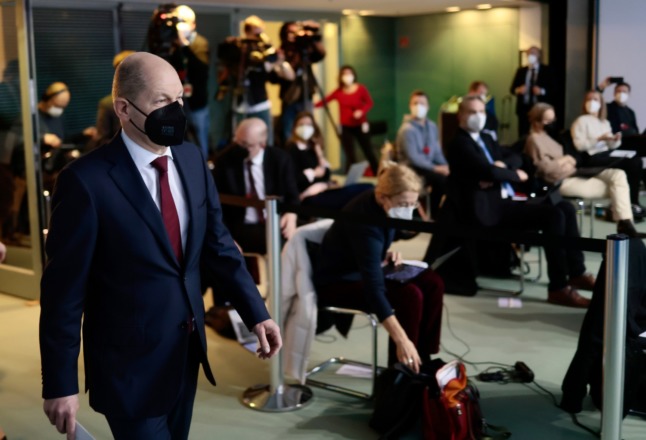KEY POINTS: How Germany will tackle latest phase of the Omicron wave

From keeping the 2G-plus rules in place to prioritising PCR tests, here's what you should know about Germany's latest Covid decisions.
What did the government and states say?
"The Omicron wave has reached Germany," said the government and states in their agreement after their Monday meeting. "The new variant of the SARS-CoV-2- virus (coronavirus) is spreading very rapidly.
Chancellor Olaf Scholz and the German state leaders said they would stick with the current strict Covid regulations, but there will be some changes, especially with regards to the testing strategy.
READ ALSO: Germany to keep current Covid measures - but change testing strategy
"The measures in place to reduce the number of contacts and the cautious behaviour of citizens has initially slowed down the steep rise, which can be observed in other countries," they said, adding that experts believe there will be a further increase in the number of infections.
Authorities say the Omicron variant is currently spreading more among the younger population, and it is unclear how things will develop when the wave reaches the older age groups.
"The extent of the hospital burden will depend decisively on the number of cases in the group of unvaccinated adults over the age of 50," the government and states said. "These numbers are currently still comparatively low.
"If there is a threat of the health system being overloaded", the federal and state governments will "agree on further-reaching measures for infection control".
Here's an overview:
2G-plus and contact restrictions remain in place
As before, vaccinated and recovered people must provide proof of a negative Covid test or a booster vaccination (the 2G-plus rule) when entering restaurants, bars or similar facilities. Some states and private businesses have also widened this rule to include leisure and cultural venues.
Unvaccinated people will continue to be barred from entry.
Meanwhile, a maximum of 10 vaccinated/recovered people can meet for private gatherings, as decided previously.
For unvaccinated and non-recovered people, only members of their own household and a max of two people from another household are allowed to meet.
READ ALSO: How Germany’s 2G-plus Covid rules have left millions of people confused
Access to PCR tests restricted
This is one of the major changes to the regulations.
PCR tests are to be set aside for staff "especially in hospitals, in surgeries, in nursing and in institutions for integration assistance" as well as for high-risk patients due to the high demand.
The federal and state health ministers are to work out a new testing strategy. However, PCR testing capacities are also to be increased.

Olaf Scholz after the meeting with state leaders. Photo: picture alliance/dpa/POOL AP | Hannibal Hanschke
The change will likely mean that people who get a positive antigen or self test, or receive a red warning in the Corona-Warn-app will not have to get a PCR test in future.
However, it is unclear, for example, whether PCR test restrictions would also affect privately paid tests that are necessary for travel abroad. It is also not clear what this would mean for the recovery status.
People only have recovery status in Germany with evidence of a positive PCR test.
We'll keep you updated when we get more information.
Changes in contact tracing
The Omicron wave is causing the number of cases to explode to such an extent that in many German districts, the health offices can't keep up with contact tracing.
Therefore, as with PCR testing, there is to be prioritisation. Health ministers will work out a plan to deal with this.
Citizens are also called upon to help. "They should inform their (Covid) contacts on their own, and use the available electronic tools for contact tracing," the agreement says.
READ MORE: Is Germany set to ease or tighten Covid measures?
Changes to quarantine and isolation rules
Again, the rules are changing in part because of the shortage of PCR tests. Soon, the general rules for isolation will also apply to Covid-hit employees in hospitals and care facilities.
This means that isolation after a proven infection can be ended after seven days by a rapid antigen test (rather than a PCR test) if the patient is symptom-free for 48 hours. Without a test, isolation ends after 10 days.
When having to quarantine as contacts of someone with Covid, it will now also be possible for this group to end the quarantine with a negative antigen test after seven days. People who've had booster shots, or are recently vaccinated or recovered are excluded from quarantine if they are contact persons with no symptoms.
READ ALSO: Germany's new rules and exceptions for Covid quarantine
Possible changes to major events
In some states, large events like football games currently take place entirely without spectators, while others allow a certain number of spectators.
The states now want to reach a uniform agreement. By February 9th a regulation should be in place that applies nationwide.
Vaccination plea
Among the older population, the proportion of unvaccinated people is "still very high at around three million people", the agreement between the government and states says.
They renewed their appeal to all those still choosing not to get vaccinated to reconsider their decision.
Next meeting in February
The Chancellor and state leaders are scheduled to meet on February 16th "unless the infection situation makes an earlier meeting necessary".
When will we see an easing of restrictions?
The government and states say they will develop a plan for easing the rules to be put in place when "an overburdening of the health system can be ruled out".
Comments (3)
See Also
What did the government and states say?
"The Omicron wave has reached Germany," said the government and states in their agreement after their Monday meeting. "The new variant of the SARS-CoV-2- virus (coronavirus) is spreading very rapidly.
Chancellor Olaf Scholz and the German state leaders said they would stick with the current strict Covid regulations, but there will be some changes, especially with regards to the testing strategy.
READ ALSO: Germany to keep current Covid measures - but change testing strategy
"The measures in place to reduce the number of contacts and the cautious behaviour of citizens has initially slowed down the steep rise, which can be observed in other countries," they said, adding that experts believe there will be a further increase in the number of infections.
Authorities say the Omicron variant is currently spreading more among the younger population, and it is unclear how things will develop when the wave reaches the older age groups.
"The extent of the hospital burden will depend decisively on the number of cases in the group of unvaccinated adults over the age of 50," the government and states said. "These numbers are currently still comparatively low.
"If there is a threat of the health system being overloaded", the federal and state governments will "agree on further-reaching measures for infection control".
Here's an overview:
2G-plus and contact restrictions remain in place
As before, vaccinated and recovered people must provide proof of a negative Covid test or a booster vaccination (the 2G-plus rule) when entering restaurants, bars or similar facilities. Some states and private businesses have also widened this rule to include leisure and cultural venues.
Unvaccinated people will continue to be barred from entry.
Meanwhile, a maximum of 10 vaccinated/recovered people can meet for private gatherings, as decided previously.
For unvaccinated and non-recovered people, only members of their own household and a max of two people from another household are allowed to meet.
READ ALSO: How Germany’s 2G-plus Covid rules have left millions of people confused
Access to PCR tests restricted
This is one of the major changes to the regulations.
PCR tests are to be set aside for staff "especially in hospitals, in surgeries, in nursing and in institutions for integration assistance" as well as for high-risk patients due to the high demand.
The federal and state health ministers are to work out a new testing strategy. However, PCR testing capacities are also to be increased.

The change will likely mean that people who get a positive antigen or self test, or receive a red warning in the Corona-Warn-app will not have to get a PCR test in future.
However, it is unclear, for example, whether PCR test restrictions would also affect privately paid tests that are necessary for travel abroad. It is also not clear what this would mean for the recovery status.
People only have recovery status in Germany with evidence of a positive PCR test.
We'll keep you updated when we get more information.
Changes in contact tracing
The Omicron wave is causing the number of cases to explode to such an extent that in many German districts, the health offices can't keep up with contact tracing.
Therefore, as with PCR testing, there is to be prioritisation. Health ministers will work out a plan to deal with this.
Citizens are also called upon to help. "They should inform their (Covid) contacts on their own, and use the available electronic tools for contact tracing," the agreement says.
READ MORE: Is Germany set to ease or tighten Covid measures?
Changes to quarantine and isolation rules
Again, the rules are changing in part because of the shortage of PCR tests. Soon, the general rules for isolation will also apply to Covid-hit employees in hospitals and care facilities.
This means that isolation after a proven infection can be ended after seven days by a rapid antigen test (rather than a PCR test) if the patient is symptom-free for 48 hours. Without a test, isolation ends after 10 days.
When having to quarantine as contacts of someone with Covid, it will now also be possible for this group to end the quarantine with a negative antigen test after seven days. People who've had booster shots, or are recently vaccinated or recovered are excluded from quarantine if they are contact persons with no symptoms.
READ ALSO: Germany's new rules and exceptions for Covid quarantine
Possible changes to major events
In some states, large events like football games currently take place entirely without spectators, while others allow a certain number of spectators.
The states now want to reach a uniform agreement. By February 9th a regulation should be in place that applies nationwide.
Vaccination plea
Among the older population, the proportion of unvaccinated people is "still very high at around three million people", the agreement between the government and states says.
They renewed their appeal to all those still choosing not to get vaccinated to reconsider their decision.
Next meeting in February
The Chancellor and state leaders are scheduled to meet on February 16th "unless the infection situation makes an earlier meeting necessary".
When will we see an easing of restrictions?
The government and states say they will develop a plan for easing the rules to be put in place when "an overburdening of the health system can be ruled out".
Join the conversation in our comments section below. Share your own views and experience and if you have a question or suggestion for our journalists then email us at [email protected].
Please keep comments civil, constructive and on topic – and make sure to read our terms of use before getting involved.
Please log in here to leave a comment.